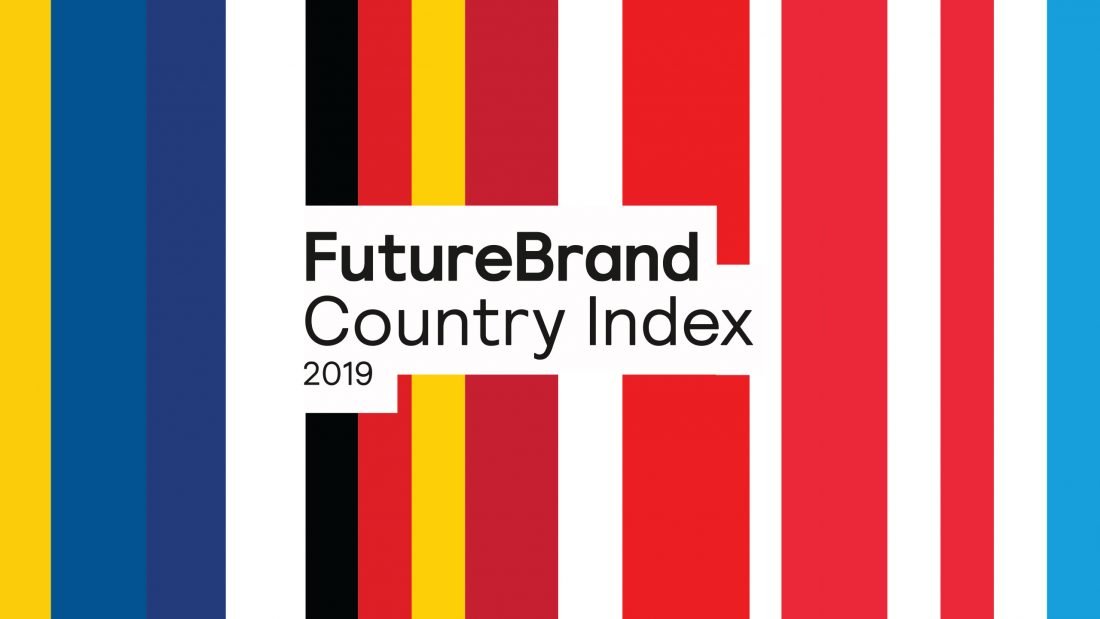What Is The Value In A Country’s Reputation?
A shift in global priorities and political change permeate FutureBrand’s latest Country Index
- ‘Environmental friendliness’, ‘Quality of Life’ and ‘Tolerance’ emerge as the new measures of a great nation.
- Political change and uncertainty cause UK and US to fall while the top countries appear to benefit from greater stability.
- The new BRICS emerge: Slovakia, Peru, Hungary, Turkey and Romania are the upcoming nations to watch.
25th June 2019: FutureBrand today release the findings from their eighth edition of the Country Index. Japan, Norway and Switzerland come out on top, the UK, US and Australia all fall down the rankings, and Slovakia, Luxembourg and Nigeria are some of the surprising winners.
While the comprehensive data set is multifaceted and nuanced, the index broadly tells the story of society’s changing values and the effect of political change since FutureBrand’s last Country Index in 2014.

The index re-orders the World Bank top 75 countries (by GDP) based on how 2,500 survey participants from 75 countries rated dimensions of a country’s purpose and experience, covering culture, business, tourism, quality of life, and value systems. This places countries with smaller GDPs on comparable footing with more traditionally dominant nations and the net effect establishes an entirely new world order.
‘Environmental friendliness’, ‘Quality of Life’ and ‘Tolerance’ all surge in importance in this year’s index as the new measures of a great nation. Surprisingly, the US has slipped five spots to 12 and the UK has fallen seven places to 19. Both nations are now broadly perceived as being less inviting to tourists, visitors, students and investors who question some of the policies now informing (and ultimately shaping) the value systems in these nations.
In response, FutureBrand’s Country Index explores the concept of ‘Countrymaking’ as a way of kick-starting tourism, investment and consumer preference for a country’s goods and services. The report reveals a range of themes directly impacting country brands and highlight the need for ‘Countrymaking’ to achieve competitive advantage over other nations and trigger growth and development:
Political stability attracts tourism and investment: The top 3 countries (Japan, Norway and Switzerland) have all reaped the benefits of political stability, social democracy and staunch neutrality respectively, while countries experiencing greater political division, uncertainty and rising socio-political unrest, (UK, US, France, India, Brazil,) have all taken significant hits. The perception of political instability on tourism and investment has never been so stark.
The new pursuit: Living richly, not just living a rich life: Quality of Life is an increasingly critical factor in the personal calculus of a country. The Quality of Life dimension averaged highest of all among the top 10 countries, and lowest in the bottom 10 countries. GDP is no longer the defining measure of a powerful country.
Businesses are more likely to invest in tolerant countries: FutureBrand’s 2014 study highlighted Extremism and Migration as dominant themes informing the future of country brands. Now, five years on, perceptions of ‘tolerance’ increased across all top 10 countries from 2014 and it’s become one of the most important factors in shaping what countries people want to visit, call home and ultimately do business with.
The new BRICS: Slovakia, Peru, Hungary, Turkey and Romania all rose between 12-24 places each and are the upcoming nations to watch. Measurements of Quality of Life, Environmental friendliness and the appeal of products ‘Made-in’ these nations all rose for these countries.
Environmental awareness = better quality of life: Perceptions of a country’s “Environmental friendliness” correlate highly with perceptions of “Health and education,” “Standard of living” and “Advanced technology”. Looking at the top-four risers of “Environmental friendliness” (Japan, Finland, Norway, and Nigeria) each either shows significant improvement or trends upward on each of these perceptions. Meanwhile, the US’s lack of commitment to environmental concerns have contributed to its fall in the rankings.
Jon Tipple, Chief Strategy Office Worldwide, FutureBrand comments:
“In the five years since our last report we have seen the UK drop 7 places making it one of the biggest fallers in terms of global perception. Despite still being in the top 20, by a whisker, falling out of the top 15 ranking should cause concern for Brand Britain. Our research indicates that polarised politics could be to blame. However, where politics may fail us, brands and businesses have an opportunity to shape the value system taking ‘countrymaking’ into their own hands ensuring investment and tourism flourish in the future.”





